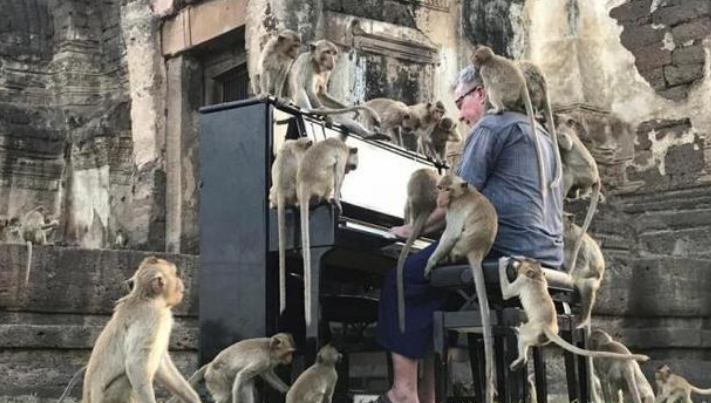
1.Why did Barton made a performance for the wild monkeys?
A To make fun of them.
B To comfort their hearts.
C To call for wildlife protection.
D To promote the local tourism industry.
解析:选B。细节理解题。根据文章第一段第二句The pianist hopes the music shows bring calm to the animals during the COVID-19 crisis. 可知,这位钢琴家希望音乐表演能在COVID-19危机期间给动物们带来平静,故选B。
2.How did the monkeys respond to Paul’s performance?
A They reacted wildly.
B Some of them listened silently.
C They showed interest in music.
D They gave him a funny welcome.
解析:选A。推理判断题。根据文章第二段The monkeys quickly surrounded Barton when he plays Greensleeves, Beethoven’s Für Elise and Michael Nyman’s Diary of Love. Some of them sat on his chair, while others climbed up his body and touched his head. 可知,当巴顿演奏乐曲时,猴子们迅速包围了他。其中一些猴子坐在他的椅子上,另一些爬上他的身体,摸了摸他的头。由此推断它们都反应疯狂,故选A。
3.The underlined word “distract” probably means _______.
A decide
B control
C shift
D attract
解析:选C。词义猜测题。根据文章第三段But Barton kept his attention on his performance, even as a small monkey ran over his hands on the instrument. Other monkeys took control of his music papers.可知,巴顿不受猴子的干扰,专注于自己的演奏,由此猜测distract意为“使分心,转移”,与shift同义,故选C。
4.What can we learn from the passage?
A Wild monkeys behaved abnormally because of the hunger.
B Barton has been dedicated to wildlife protection till now.
C It’s possible that the music can play a part of monkeys’ life.
D The COVID-19 brought about more disasters to the nature.
解析:选B。推理判断题。根据文章最后一段The monkeys are Barton’s latest animal fans. Past wildlife audiences included elephants living in special protected areas.可知,猴子是巴顿最新的动物粉丝。过去的野生动物观众包括生活在特别保护区的大象。由此说明巴顿一直致力于保护野生动物,故选B。